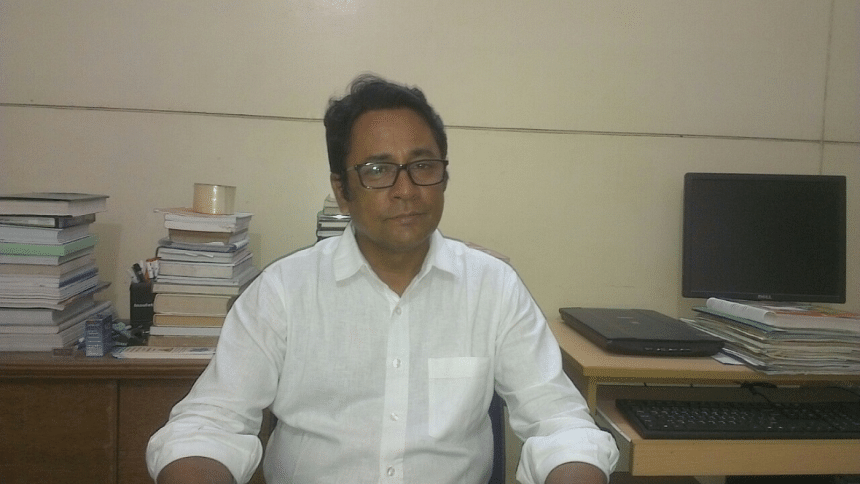Working with the human mind

One of the founding members of drug-rehab centre CREA, Tarun Kanti Gayen has been serving as its Chief Executive since its inception in 1999. After getting his Master's in Psychology from the University of Dhaka, he started his professional career as a Drug Counselor. Besides his administrative role, Mr. Gayen does regular clinical work with drug users and clients with diverse mental health problems. In 2010, he earned an MS and M. Phil. in Clinical Psychology, and is currently an adjunct faculty to the Department of Clinical Psychology, University of Dhaka. He is also the acting General Secretary of Bangladesh Clinical Psychology Society (BCPS).
Did you grow up wanting to be a psychologist? Why psychology? Was there a moment in your life when you knew that was what you wanted to do, or did it just sort of happen?
No, not from the very beginning, at least not during my school days. Throughout my college years I dreamt of studying astrophysics. I was then an avid reader of science fiction and popular books on astronomy, physics, etc. And certainly at that period of my life, I was highly influenced by two persons at least – my eldest brother, now a scientist and Professor of Physics at an American university, and one of my teachers at Rangamati Govt. College, Prof. Hari Narayan Dutta, a passionate mathematician. However, later on in my college years at least two incidents might have triggered me to choose my career path in psychology. One was coming across a book written in Bangla on Freudian psychology, which had completely mesmerised me. The other was also a book, named Introduction to Psychology. It had big illustrations and vignettes that attracted me extremely to the discipline, and I decided to pursue the subject at the University of Dhaka.
I think it's a common misconception, but we tend to use the terms psychologist and psychiatrist synonymously. What's the difference?
A psychiatrist is first and foremost a medical doctor. She/he goes through higher training in psychiatry, the discipline which approaches mental health problems with medicines. On the other hand, a psychologist is someone who has had her/his education and higher training in psychology, the discipline which studies and intervenes in the cognition, emotion and behaviour of human beings with the aim of enhancing their efficacy or repair impairments. Psychologists do not prescribe medicine.
Please discuss your motivation and inspiration for creating CREA.
I started my career as a counsellor at a drug rehabilitation centre around 1990-91. I believe I enjoyed the job a lot and became quite popular among my clients. During my work I observed how much a drug user and his/her family suffers. I clearly found that the treatment approach that was being used at the facility could have been made more scientific and evidence-based. So, later on to serve the drug users better, three of my colleagues and I took an initiative to start CREA.
What is clinical psychology? How would you describe the field to someone who doesn't understand it?
A dictionary definition of clinical psychology is somewhat like this: the branch of psychology concerned with the assessment and treatment of mental illness and disability.
How do you distract yourself from stress? Music? Hobbies? What works best for you?
Exercise, meditation, reading books and certainly music work best for me.
What influenced you to take up teaching, especially since you are already running a successful organisation and are involved in psychological associations?
I took it up out of my own interest. To tell you frankly, it is teaching through which you can learn your discipline thoroughly. Because when you stand in front of your students you cannot do it half-prepared. Teaching is helping me become theoretically thorough in Clinical Psychology. Besides, I have another hidden drive – to influence young minds to become inquisitive and thoughtful about human sufferings.
What research work have you been involved in?
So far my research experience has revolved around complex behaviours of the drug users and their relapse issues. I have also done research on issues like burn-out problems of psychology professionals, mental health and coping style of the doctors working at Burn Unit at DMCH, experience and coping with first menstrual cycle among teenage girls, etc. My current interest is in understanding the fragility of the human 'self.'
What's the most challenging issue you face in your profession?
To create quality service within peoples' purchasing capacity.
What do you think should be the top three personality traits for being a successful Chief Executive?
Not to bypass but face problems squarely; to gain the trust of your employees; and to study and keep up with the changing world.

 For all latest news, follow The Daily Star's Google News channel.
For all latest news, follow The Daily Star's Google News channel. 



Comments